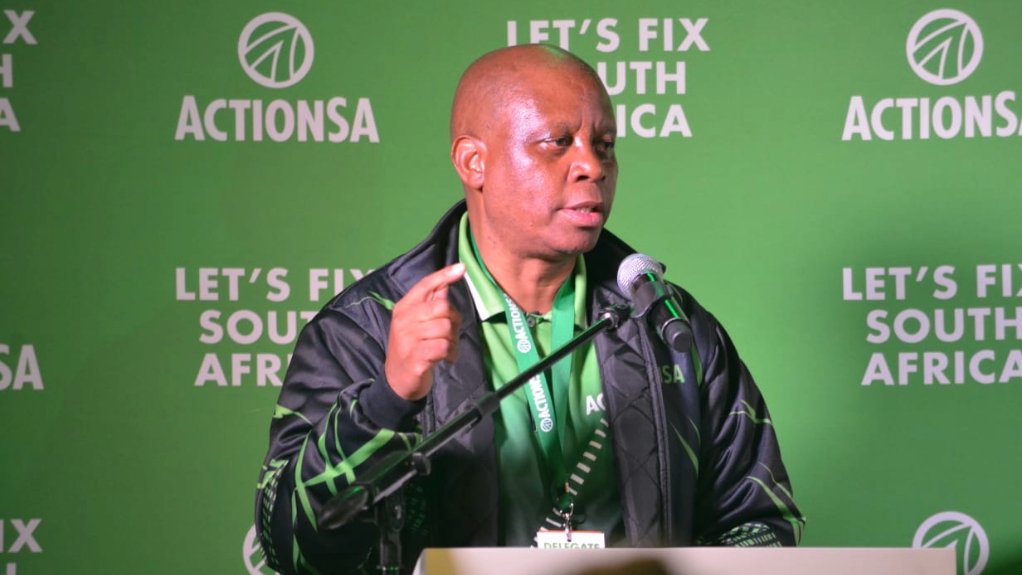ActionSA said it will be tabling a Draft Resolution in the National Assembly for the creation of an ad-hoc committee to investigate, deliberate, and shape urgent reforms aimed at “genuine and transformative economic justice”.
Speaking at the launch of ActionSA’s economic transformation agenda at the Apartheid Museum in Johannesburg, on Wednesday, ActionSA Parliamentary Caucus chairperson Dr Kgosi Letlape explained that the draft resolution aimed to investigate South Africa’s post-1994 legislative framework, which set out to transform the country’s economy, with a specific focus on evaluating the actual outcomes of these laws in relation to their stated objectives.
Letlape said if instituted, the committee would conduct substantive public hearings with ordinary South Africans, relevant experts, business and industry, civil society organisations, and academics regarding South Africa’s persistent structural inequalities and potential interventions.
The draft resolution will allow all political parties in Parliament to make submissions and will also consider these submissions and identify the legislative and policy reforms required to effect economic justice and propose interventions to the National Assembly.
Letlape pointed out that the proposed legislative aimed to build broad-based agreement on the way forward, without imposing a singular viewpoint to the exclusion of others, and ensure that differing perspectives were subject to open and fair deliberation.
“In a context where no single party commands a majority, this mechanism provides an opportunity for meaningful, constituency-driven engagement. It breaks the cycle of endless dialogues and instead advances concrete legislative reform grounded in accountability rather than rhetoric,” he explained.
ActionSA president Herman Mashaba explained that his party embarked on this effort to establish a “dedicated and constitutionally” empowered platform for “real legislative reforms” that advanced economic justice in South Africa.
“The frightening reality is that we can no longer speak about the ‘previously marginalised’, because the marginalisation has not stopped after the end of apartheid. It continues even as I stand before you here, today through sub-standard education, failed economic policy, corruption and the complete failure to manage immigration. In truth, democratic, post-Apartheid administrations had their job cut out for them,” he said.
Mashaba noted that the country had witnessed successive African National Congress (ANC) administrations that were expected to constitute “a government for the people by the people”, noting that these became “governments for the politically connected by their comrades”.
“You needed to be a cadre with ‘struggle credentials’, or connected to one, to seriously benefit from the corrective transformative ANC policies. Those who did not meet this criterion either had peanuts thrown at them or were entirely left out in the cold. This is where the expression ‘It is cold outside the ANC’ comes from,” he noted.
He pointed to the Affirmative Action / Employment Equity Act, and broad based black economic empowerment (BBBEE) laws which were enactment under the ANC, implementation of which he said had proven to be “poor, weakened by all manners of incompetence and selective application”.
The discussion around transformation had stalled in the country through a spectacular failure of imagination that had led people to believe the choice was between either BBBEE or nothing – like an alternative could not exist, he said.
“This cannot be allowed to continue while 60% of young people remain without the prospects of employment or further studies,” Mashaba added.
DIRECT, EFFECTIVE RESPONSE
ActionSA said it would put forward a basket of essential policy levers into the new national dialogue on transformation, designed to produce real, measurable change, noting that if implemented, they would respond directly and effectively to the constitutional call for redress that it believed had long been ignored.
Mashaba said they would respond to inclusive economic empowerment; social investment grants; housing, land reform, and spatial justice; gender justice and social cohesion.
He pointed out that this response must be systemic.
“…it must look not only at the economy, but at the entire society, including access to land, spatial planning, education, healthcare, safety and security, and more. ActionSA is not opposed to black economic empowerment. On the contrary, we believe that economic justice is a historic imperative,” he said.
However, he noted that his party was opposed to the “narrow, corrupt, and politically manipulated fashion” in which it has been implemented.
“For decades, the ANC has chased the illusion of equality of outcome, handing wealth to the connected few while leaving the majority behind. What we need now is a model that creates equality of opportunity for all. A model that breaks down the real barriers that keep millions excluded from the promise of freedom,” he explained.
EMAIL THIS ARTICLE SAVE THIS ARTICLE ARTICLE ENQUIRY FEEDBACK
To subscribe email subscriptions@creamermedia.co.za or click here
To advertise email advertising@creamermedia.co.za or click here











